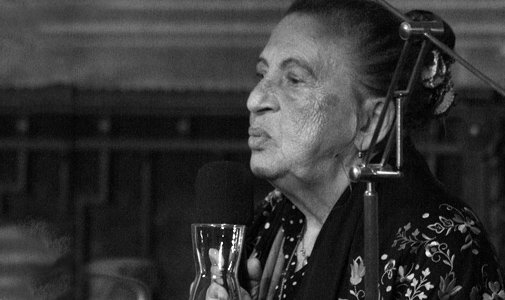Ceija Stojka(AT)
Writer, Painter and Musician, Survivor of the Holocaust
Life story

Ceija Stojka (1933 - 2013) was an Austrian-Romani writer, painter and musician, survivor of the Holocaust. She was from the Lovari ethnic group the fifth of six children, sister of Karl Stojka and Mongo Stojka, also writers and musicians. Together with her mother and four of the five brothers she survived the Holocaust and the internment at Auschwitz and Bergen-Belsen. Her father in 1941 was deported to the Dachau concentration camp, then he was killed in Schloss Hartheim. In 1943, the whole Stojka family was deported into the Auschwitz Birkenau II. concentration camp, where most of them were executed.
Ceija Stojka survived the Holocaust, but these never forgettable experiences become a central and eternal theme of her artistic work since 1989. Her paintings reflect upon the entrenched sorrow in the bodies and spirit of the victims. There are some books and film which are capturing her life. She was a charismatic author and she wrote the first Roma autobiographical account on the Nazi persecution. The book was published in 1988 with the title “We Live in Seclusion:The Memories of a Romni”. It made the European public aware about the struggle of Austrian Roma in the Nazi persecution. Later on in 1992 she published another autobiographical book called: “Reisende auf dieser Welt /"Travellers on This World". Besides painting and writing Ceija also sang in Romanes. In 1989, at the age of 56, she began to paint. Her work has been exhibited in western and eastern Europe and in Japan. In 2005 the Jewish Museum of Vienna organized an exhibition with the title of „ Ceija Stojka, Leben!”. Also she had the traveling exhibit in 2010 in the United States was the first time her artwork has been exhibited in the U.S. „I always try to portray my feelings and memories. I want to show my own world to the people. It is important to understand that, we are all human beings and art allows us to live and exist. Art can demonstrate and connect us„
Ceija Stoika, an outstanding Austrian Romani woman, who was a key figure for the history, art, and literature of Romani culture in Europe. Her artistic account offers stories and visual representation of trauma as a new means to face with the past in order to start a new and meaningful dialogue and challenge the various forms of discrimination and violence in the present Europe.
Quotes
"I was born into a family of Vlach Roma, who followed a traditional nomadic life. I was the fifth child of my parents who had six children altogether. Near a small village my mother said: The time has come! an in half an hour I came into this world. They bathed me int he cold runnel. It was May. There was a lot of Gypsies with us and they celebrated my birth for five more days. The next day I was baptized. This is something very important for the Roma.”
“The crematory was in front of us. The chimney was smoking day and night. But my mother kept telling me: Never talk about this Ceija, do not talk to anyone about this crematory. Say it is a bakery, and they are baking bread for us every day.
„I am afraid that Europe is forgetting its past and that "Auschwitz is only sleeping. Anti-Gypsy threats, policies and actions worry me greatly and make me very sad,"
"If the world does not change now, if the world does not open its doors and windows, if it does not build peace -- true peace -- so that my great-grandchildren have a chance to live in this world, then I cannot explain why I survived Auschwitz, Bergen-Belsen, and Ravensbruck,"
"I was born into a family of Vlach Roma, who followed a traditional nomadic life. I was the fifth child of my parents who had six children altogether. Near a small village my mother said: The time has come! an in half an hour I came into this world."
„I always try to portray my feelings and memories. I want to show my own world to the people. It is important to understand that, we are all human beings and art allows us to live and exist. Art can demonstrate and connect us„
Books, Articles, Statements
Wir leben im Verborgenen: Erinnerungen einer Rom-Zigeunerin "We Live in Seclusion. The Memories of a Romni". 1st ed. Vienna: Picus, 1988.
Reisende auf dieser Welt: Aus dem Leben einer Rom-Zigeunerin. "Travellers on This World" Vienna: Picus, 1992.
Meine Wahl zu schreiben–ich kann es nicht/O fallo de isgiri–me tschschanaf les: Gedichte und Bilder. Landeck: Emigan Yayinlari Editions, 2003.
Träume ich, dass ich lebe? Mein Leben in Bergen-Belsen. Vienna: Picus, 2005.
Stories in the anthology Fern von uns im Traum
CD: Me Dikhlem Suno. Vienna: non food factory, 2000.
Press about the Elder